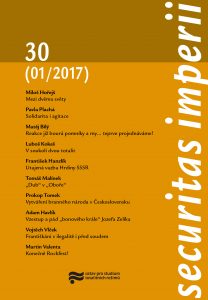Dub“ v „Oboře“. Západoněmečtí velvyslanci v hledáčku Státní bezpečnosti v letech 1968–1989
An “Oak” in a “Game Park”. Ambassadors of West Germany in the spotlight of the State Security 1968–1989
Author(s): Tomáš MalínekSubject(s): Government/Political systems, Security and defense, Post-War period (1950 - 1989)
Published by: Ústav pro studium totalitních režimů
Keywords: secret services; StB; Czechoslovakia; West Germany;diplomacy;1968–1989
Summary/Abstract: The study looks into the surveillance of ambassadors of Federal Republic of Germany (FRG) in Communist Czechoslovakia, which the Czechoslovak counter-intelligence carried out in the 1970s and 1980s as part of operation “Obora” (game park). The paper aims to cast light on the methods, targets and real outcomes of the work performed by the State Security (StB). The text also deals with the period when a commercial representation of FRG existed in Prague in the years 1968–1973. StB tested nearly all possible forms of surveillance and “active work” on Otto Heipertz, its head, which it later used also to target ambassadors. The most efficient tools used by the counter- -intelligence included tailing, checking post, wiretapping and deploying agents whose task it was to earn trust of the ambassador under surveillance. In this respect also agents from among Czech staff working at embassies were a success. Ambassadors Gerhard Ritzel and Jürgen Diesel tried to maintain decent relations with the Czechoslovak government in the spirit of Ostpolitik and they usually coordinated their activities aimed at supporting anti-Communist opposition with Bonn’s official foreign politics. The end of the politics of détente and the appointment of Klaus Meyer as ambassador in 1982 marked the beginning of truly problematic relationship with Czechoslovak authorities. On the other hand, Werner Schattmann, Meyer’s successor, was not particularly interested in the activities of the dissident movement and maintained good relationships with the government and CPC representatives. The tenure of the last pre-1989 ambassador, Hermann Huber, was affected by the crisis surrounding the East German refugees hiding at the German embassy in Prague and the StB’s inability to solve the situation after it had spent an enormous amount of time and much effort on surveillance of West German ambassadors. The real intelligence value of the acquired information, however, often did not correspond to it.
Journal: Securitas imperii
- Issue Year: 2017
- Issue No: 30
- Page Range: 176-200
- Page Count: 25
- Language: Polish

